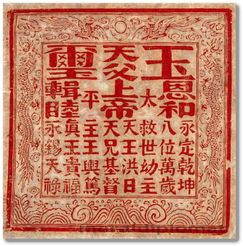Pursuing a Heavenly Kingdom
In 1853, revolutionaries led by the peasant Hong Xiuquan captured the city of Nanjing, in the Chinese province of Jiangsu. The seizure of this major city followed a string of unlikely conquests
made by the group, who called their new empire the Heavenly Kingdom of Great Peace. From 1851 until 1864, this “Taiping” (Great Peace) movement took control of a region of China inhabited by 30
million people. In the massive wars they waged against the ruling Qing dynasty, more than 20 million people died.
Stripped of its context, the Taiping movement is baffling. How did a handful of peasants from southern China manage to drum up a movement that would challenge the Qing Empire and change the face
of China, when other rebellions for decades had failed?
The answer lies with the founder of the new movement. In 1837, Hong Xiuquan had a series of visions. In these visions he was a royal in a heavenly kingdom, being carried toward a palace. Before
he entered, he was laid in a bed, his heart was removed and a new, pure heart was put in its place. He was brought to meet a wise old man with a long beard; Hong realized this was his true
Father. His Heavenly Father (God) lamented the corruption and wickedness He saw in the world (China). Feeling despair, Hong begged permission to descend from heaven to rid the world of demons. He
was sent down to earth with his wise elder brother.
Hong began to tell his friends and neighbors about his vision. One of them suggested that he read a pamphlet he had been given a few years earlier. In the 1820s, Protestant missionaries from the
United States and Britain had begun to translate Bibles and to pass out tracts to the Chinese in the port cities where they were allowed. One of these pamphlets had fallen into Hong’s hands,
although he had not read it at the time of his visions. The tract spoke of a Heavenly Father who had sent His Son, Jesus, down from Heaven into the world to redeem it. It spoke of commandments to
shun idols and to worship the One true God.
To Hong this changed the world. He realized the meaning of his visions: (in his vision) he was the younger brother (a friend) of Jesus Christ. The One true God had given him the charge to rid
China of idols and demons. Hong was baptized and set out preaching, destroying idols, and prophesying.
Eventually he would raise an army that would set out to topple the blaspheming emperor in order to establish the kingdom of heaven on earth (born again people), ushering in a reign of great
peace(in the hearts of many), free from the troubles that plagued 19th century China; strange intersection of Christianity and Chinese civilization
The Taiping Rebellion is an example of the unique power of religion (Christianity specifically). The transcendent reaches beyond humanity and for that reason has a tendency to change humanity. It
does not take much study to see movements of theology beneath the history of civilizations.
As many modern secularists point out, religion inspired many of the famous and destructive wars of the past. Taiping Christianity, though clearly destructive, declared the equality of women,
freed slaves, abolished foot-binding and proscribed alcohol (healthy in moderation; antiseptic), etc.
We can be sure that religion will be the motive for good and evil deeds in the future maybe the near future. As to what determines which effect a religious movement will have on the world, I
cannot fairly comment, although I have ideas. What is certain is that religion is not going away, and certainly not for the reasons the new atheists would suggest.
It is more than a set of metaphysical beliefs, or a list of moral imperatives, or a social group. It is the heritage of humanity, a response to the transcendent and a spring of peace in the soul. It will likely be the means of healing some of the current challenges of the modern world(applying only to Christianity); the decoupling of marriage and family, new addictions in a world of instant gratification, and the alienation that seems to follow fundamentalist individualism.
Because of religion there continues to be great cause for hope for a society that is more virtuous, for the kind of heavenly kingdom in the heart of man imagined by Hong Xiuquan.
Special note: Hong literally thought he would destroy all demons and literally bring China, and quite possibly the world into this real Kingdom where everyone worshipped the one
true God and that nothing reigned but peace. But what he did was set the pace for a future group of Christians that would inhabit China (secretly) for years to come.
Mt 24:35 "Heaven and earth shall pass away, but my words shall not pass away."
Jn 14:23 "Jesus answered and said unto him, If a man love me, he will keep my words: and my Father will love him, and we will come unto him, and make our abode with him."
Jn 12:48 "He that rejecteth me, and receiveth not my words, hath one that judgeth him: the word that I have spoken, the same shall judge him in the last day."

